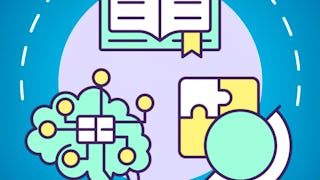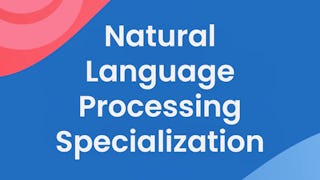This course provides an overview of some different Natural Language Processing (NLP) techniques, their underlying principles, and their applications in engineering. The focus will be on the practical implementation of NLP methods such as word embeddings, neural networks, attention mechanisms, and advanced deep learning models to solve real-world engineering problems.



Wichtige Details

Zu Ihrem LinkedIn-Profil hinzufügen
Dezember 2024
9 Aufgaben
Erfahren Sie, wie Mitarbeiter führender Unternehmen gefragte Kompetenzen erwerben.


Erwerben Sie ein Karrierezertifikat.
Fügen Sie diese Qualifikation zur Ihrem LinkedIn-Profil oder Ihrem Lebenslauf hinzu.
Teilen Sie es in den sozialen Medien und in Ihrer Leistungsbeurteilung.

In diesem Kurs gibt es 4 Module
This module provides an in-depth exploration of Natural Language Processing (NLP), a crucial area of artificial intelligence that enables computers to understand, interpret, and generate human language. By combining computational linguistics with machine learning, NLP is applied in various technologies, from chatbots and sentiment analysis to machine translation and speech recognition. The module introduces fundamental NLP tasks such as text classification, Named Entity Recognition (NER), and neural machine translation, showcasing how these applications shape real-world interactions with AI. Additionally, it highlights the complexities of teaching language to machines, including handling ambiguity, grammar, and cultural nuances. Through the course, you will gain hands-on experience and knowledge about key techniques like word representation and distributional semantics, preparing them to solve language-related challenges in modern AI systems.
Das ist alles enthalten
2 Videos17 Lektüren2 Aufgaben1 App-Element2 Diskussionsthemen
This module focuses on optimization techniques critical for machine learning, particularly in natural language processing (NLP) tasks. It introduces Gradient Descent (GD), a fundamental algorithm used to minimize cost functions by iteratively adjusting model parameters. You’ll explore variants like Stochastic Gradient Descent (SGD) and Mini-Batch Gradient Descent to learn more about their efficiency in handling large datasets. Advanced methods such as Momentum and Adam are covered to give you insight on how to enhance convergence speed by smoothing updates and adapting learning rates. The module also covers second-order techniques like Newton’s Method and Quasi-Newton methods (e.g., BFGS), which leverage curvature information for more direct optimization, although they come with higher computational costs. Overall, this module emphasizes balancing efficiency, accuracy, and computational feasibility in optimizing machine learning models.
Das ist alles enthalten
2 Videos15 Lektüren2 Aufgaben1 Diskussionsthema
This module explores Named Entity Recognition (NER), a core task in Natural Language Processing (NLP) that identifies and classifies entities like people, locations, and organizations in text. We’ll begin by examining how logistic regression can be used to model NER as a binary classification problem, though this approach faces limitations with complexity and context capture. We’ll then transition to more advanced techniques, such as neural networks, which excel at handling the complex patterns and large-scale data that traditional models struggle with. Neural networks' ability to learn hierarchical features makes them ideal for NER tasks, as they can capture contextual information more effectively than simpler models. Throughout the module, we compare these methods and highlight how deep learning approaches such as Recurrent Neural Networks (RNNs) and transformers like BERT improve NER accuracy and scalability.
Das ist alles enthalten
1 Video12 Lektüren2 Aufgaben1 App-Element1 Diskussionsthema
The Word2Vec and GloVe models are popular word embedding techniques in Natural Language Processing (NLP), each offering unique advantages. Word2Vec, developed by Google, operates via two key models: Continuous Bag of Words (CBOW) and Skip-gram, focusing on predicting a word based on its context or vice versa (Word2Vec). The GloVe model, on the other hand, created by Stanford, combines count-based and predictive approaches by leveraging word co-occurrence matrices to learn word vectors (GloVe). Both models represent words in a high-dimensional vector space and capture semantic relationships. Word2Vec focuses on local contexts, learning efficiently from large datasets, while GloVe emphasizes global word co-occurrence patterns across the entire corpus, revealing deeper word associations. These embeddings enable tasks like analogy-solving, semantic similarity, and other linguistic computations, making them central to modern NLP applications.
Das ist alles enthalten
3 Videos26 Lektüren3 Aufgaben1 App-Element1 Diskussionsthema
Dozent

Empfohlen, wenn Sie sich für Machine Learning interessieren

Edureka

DeepLearning.AI
Warum entscheiden sich Menschen für Coursera für ihre Karriere?





Neue Karrieremöglichkeiten mit Coursera Plus
Unbegrenzter Zugang zu 10,000+ Weltklasse-Kursen, praktischen Projekten und berufsqualifizierenden Zertifikatsprogrammen - alles in Ihrem Abonnement enthalten
Bringen Sie Ihre Karriere mit einem Online-Abschluss voran.
Erwerben Sie einen Abschluss von erstklassigen Universitäten – 100 % online
Schließen Sie sich mehr als 3.400 Unternehmen in aller Welt an, die sich für Coursera for Business entschieden haben.
Schulen Sie Ihre Mitarbeiter*innen, um sich in der digitalen Wirtschaft zu behaupten.
Häufig gestellte Fragen
Access to lectures and assignments depends on your type of enrollment. If you take a course in audit mode, you will be able to see most course materials for free. To access graded assignments and to earn a Certificate, you will need to purchase the Certificate experience, during or after your audit. If you don't see the audit option:
The course may not offer an audit option. You can try a Free Trial instead, or apply for Financial Aid.
The course may offer 'Full Course, No Certificate' instead. This option lets you see all course materials, submit required assessments, and get a final grade. This also means that you will not be able to purchase a Certificate experience.
When you purchase a Certificate you get access to all course materials, including graded assignments. Upon completing the course, your electronic Certificate will be added to your Accomplishments page - from there, you can print your Certificate or add it to your LinkedIn profile. If you only want to read and view the course content, you can audit the course for free.
You will be eligible for a full refund until two weeks after your payment date, or (for courses that have just launched) until two weeks after the first session of the course begins, whichever is later. You cannot receive a refund once you’ve earned a Course Certificate, even if you complete the course within the two-week refund period. See our full refund policy.
Weitere Fragen
Finanzielle Unterstützung verfügbar,
 enthalten
enthalten


